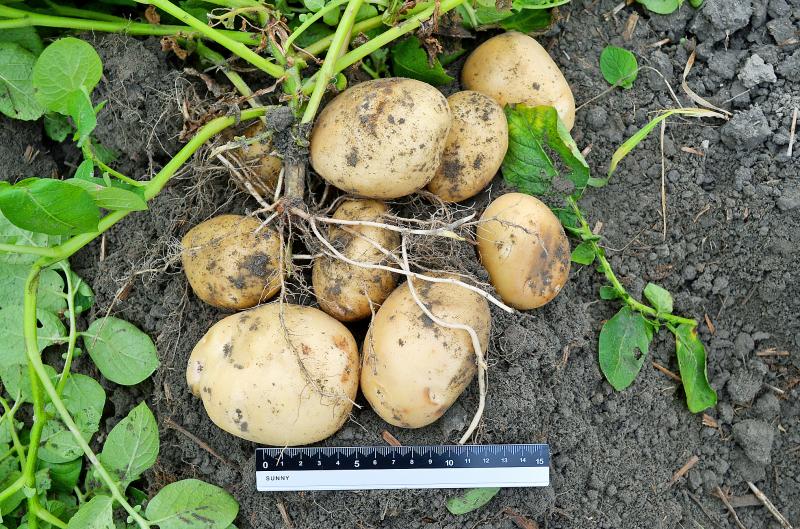A cultivar of potato resistant to diseases and flooding that has been developed in Taiwan could help ease a global shortage of the crop amid climate change, the Taiwan Agricultural Research Institute said on Friday.
Speaking at a crop demonstration in Chiayi County’s Lioujiao Township (六腳), the institute said the potato was created in a program to crossbreed the Atlantic potato and high-yield varieties, which it conducted from 2016 to 2019.
The resulting cultivar, named Tainung No. 4, is tolerant of wet conditions, resilient against disease and easy to process — all desirable qualities for large-scale food production and organic farming, it said.

Photo courtesy of the Taiwan Agricultural Research Institute
The Tainung No. 4 was last month patented by the Agriculture and Food Agency, and the institute said it expects to begin working with farmers in the township to plant it some time next year.
Climate change has affected potato farming by causing floods and diseases, resulting in significant revenue losses, the institute said, adding that environmentally resilient varieties are in high demand.
An important measure of potato quality is dry matter content, which refers to the percentage of a potato’s weight that remains after water is removed from it, the institute said.
The Tainung No. 4 has a dry matter content of 22 percent, about the same as its parent, the Atlantic potato, which is considered a quality crop, and higher than that of the widely planted Kennebec potato at 19 percent, it said.
Tainung potatoes are evenly sized, and about 70 percent of the yield consists of large marketable tubers, while its low sugar content means it does not brown easily when fried, the institute said.
Another advantage is that the potato is easy to cook, as it has a pleasant, crumbly texture and can be boiled for a long time without becoming mushy, it said.
The variety has a planting to harvest time of about 100 to 110 days, is a mid-season crop and does not fully wither after being harvested, the institute added.

A strong continental cold air mass is to bring pollutants to Taiwan from tomorrow, the Ministry of Environment said today, as it issued an “orange” air quality alert for most of the country. All of Taiwan except for Hualien and Taitung counties is to be under an “orange” air quality alert tomorrow, indicating air quality that is unhealthy for sensitive groups. In China, areas from Shandong to Shanghai have been enveloped in haze since Saturday, the ministry said in a news release. Yesterday, hourly concentrations of PM2.5 in these areas ranged from 65 to 160 micrograms per cubic meter (mg/m³), and pollutants were

Taiwan’s armed forces have established response protocols for a wide range of sudden contingencies, including the “Wan Chun Plan” to protect the head of state, the Ministry of Defense (MND) said today. After US President Donald Trump on Saturday launched a series of airstrikes in Venezuela and kidnapped Venezuelan President Nicolas Maduro, concerns have been raised as to whether China would launch a similar “decapitation strike” on Taiwan. The armed forces regularly coordinate with relevant agencies and practice drills to ensure preparedness for a wide range of scenarios, Vice Minister of National Defense Hsu Szu-chien (徐斯儉) told reporters before a

EVA Airways on Saturday said that it had suspended a pilot and opened an investigation after he allegedly lost his temper and punched the first officer several times as their plane was taxiing before takeoff at Los Angeles International Airport. According to a report published on Thursday by The Reporter, the incident occurred after the flight’s Malaysian first officer tried to warn the Taiwanese pilot, surnamed Wen (文), that he was taxiing faster than the speed limit of 30 knots (55.6kph). After alerting the pilot several times without response, the first officer manually applied the brakes in accordance with standard operating

NOT AN OPENING: Trump’s violation of international law does not affect China’s consideration in attacking Taiwan; Beijing lacks capability, not precedent, an official said Taiwanese officials see the US’ capture of the president of Venezuela as a powerful deterrent to Beijing’s aggression and a timely reminder of the US’ ability to defeat militaries equipped with Chinese-made weapons. The strikes that toppled Venezuelan President Nicolas Maduro signaled to authoritarian leaders, including Chinese President Xi Jinping (習近平), US President Donald Trump’s willingness to use military might for international affairs core to US interests, one senior official in Taipei’s security circle said. That reassured Taiwan, the person said. Taipei has also dismissed the idea that Trump’s apparent violation of international law could embolden Beijing, said the official, who was not